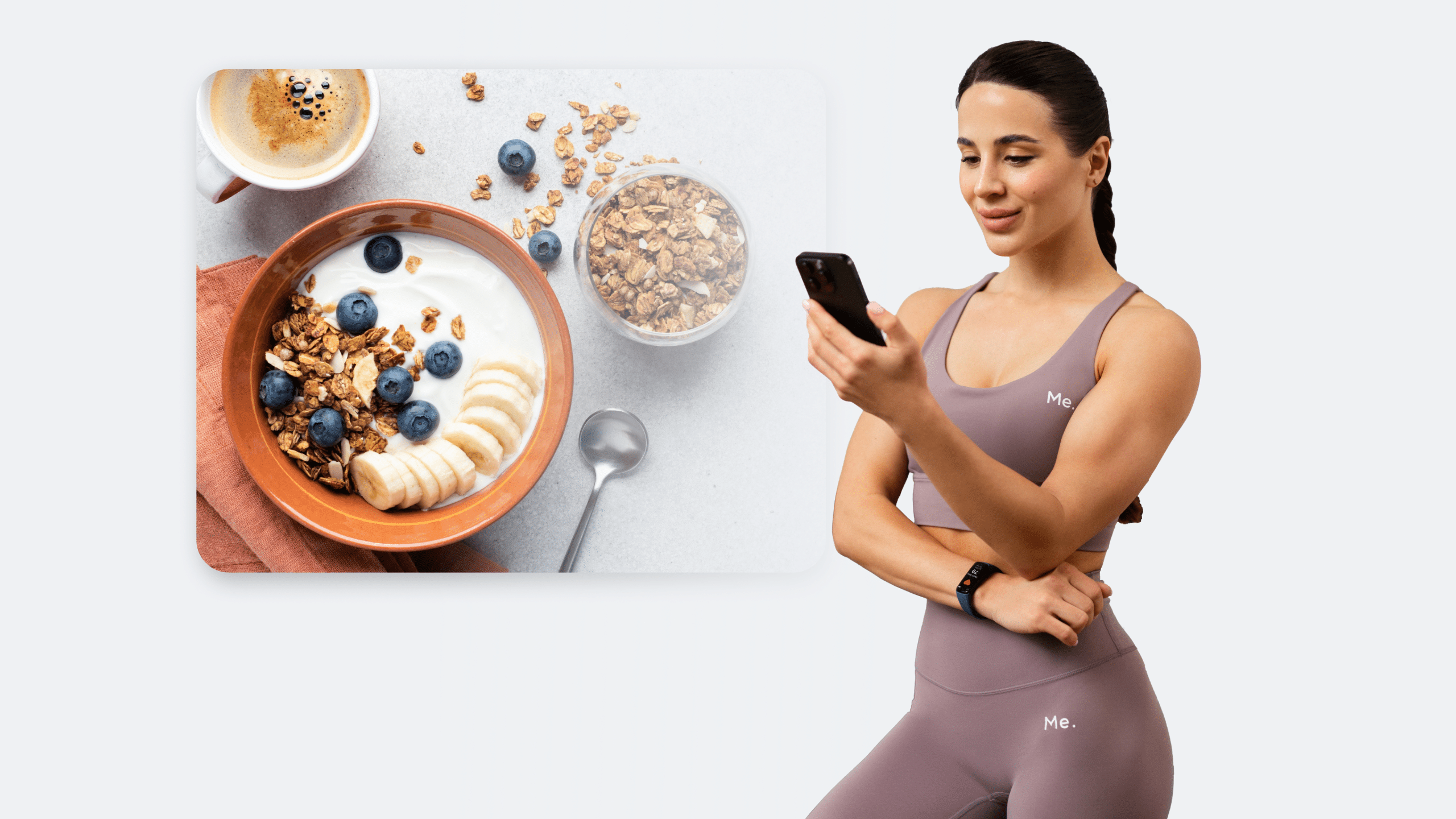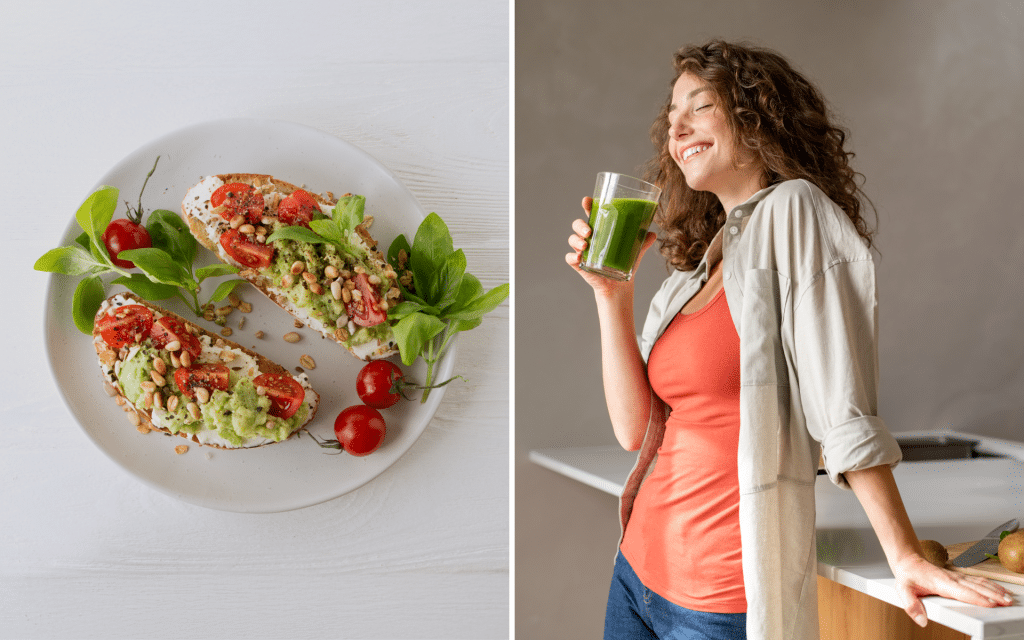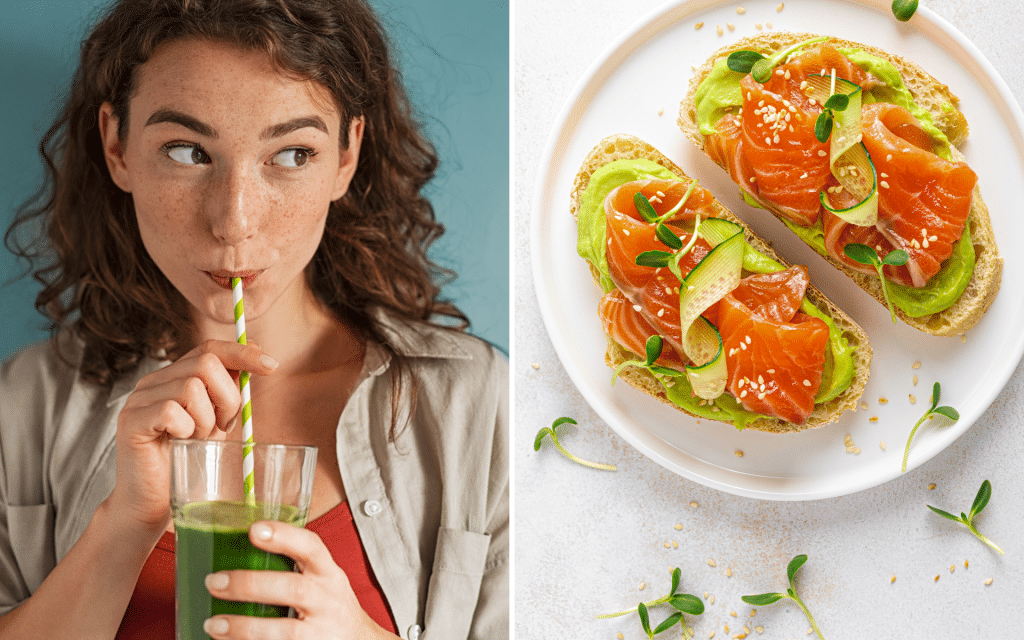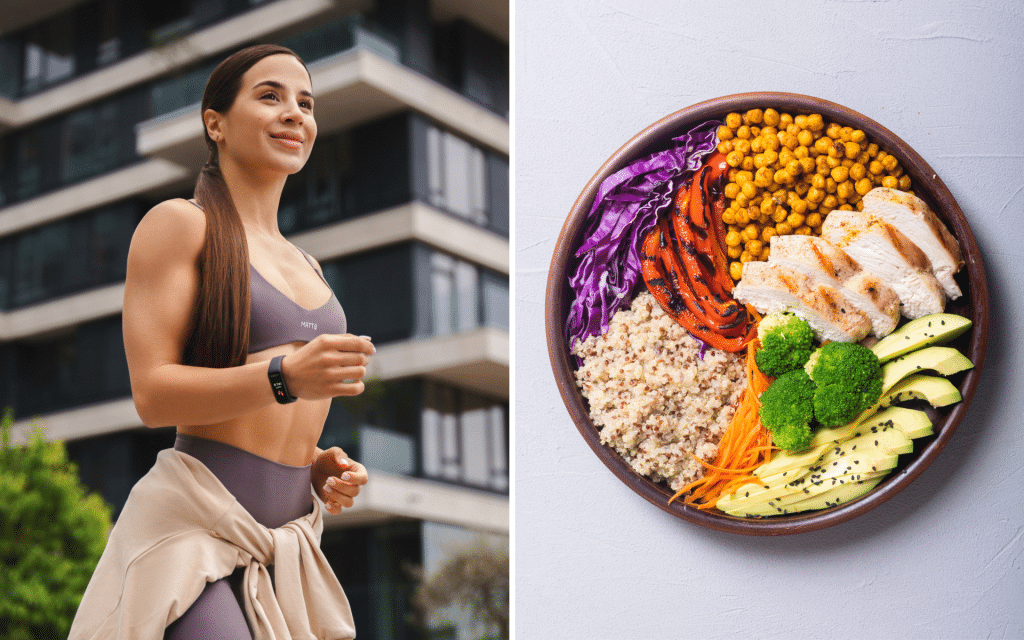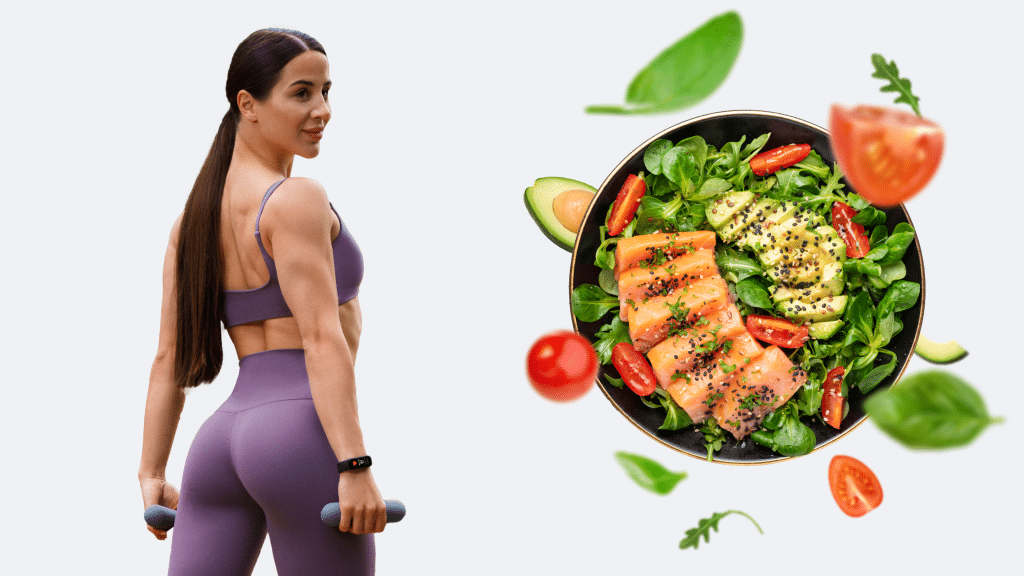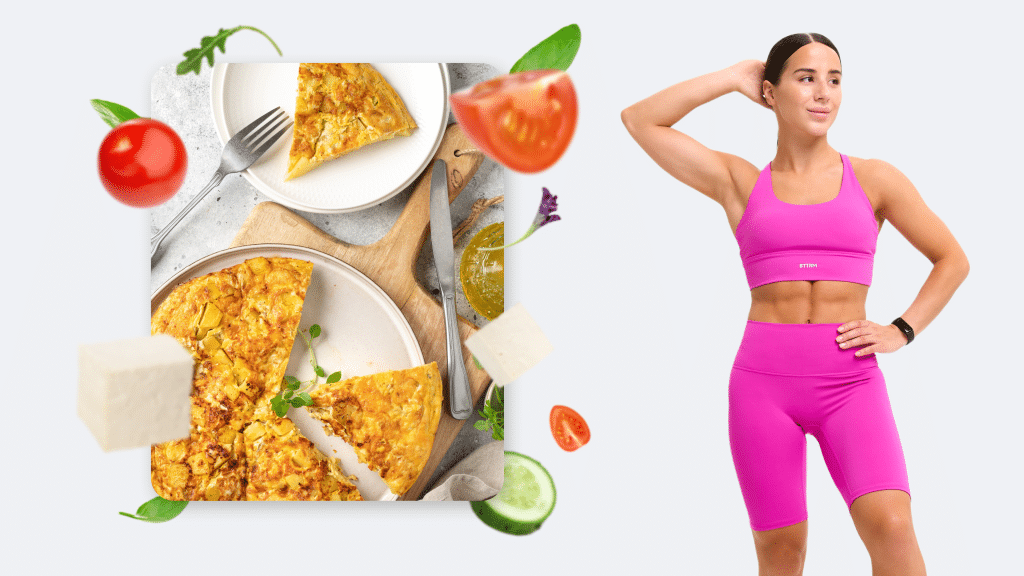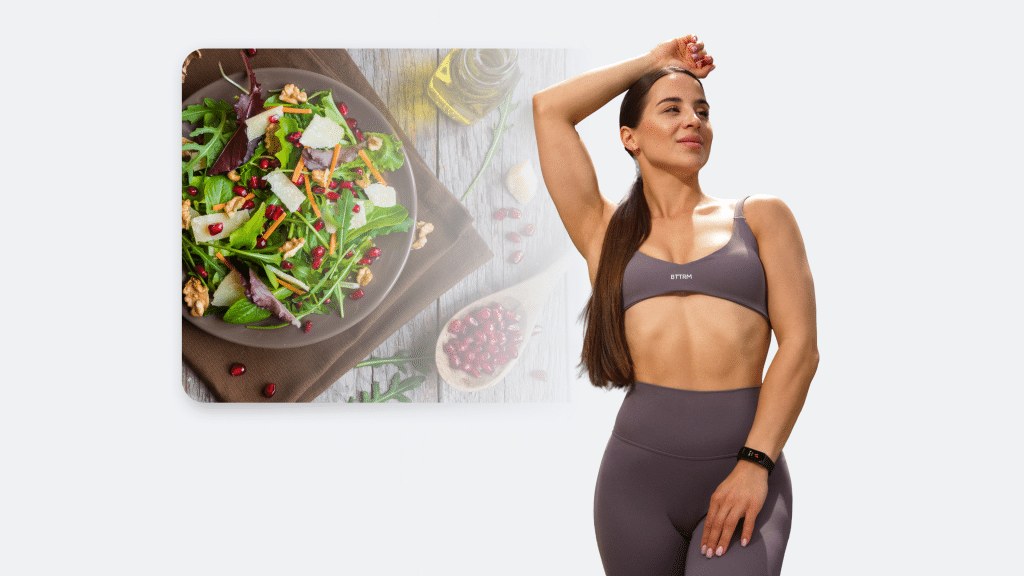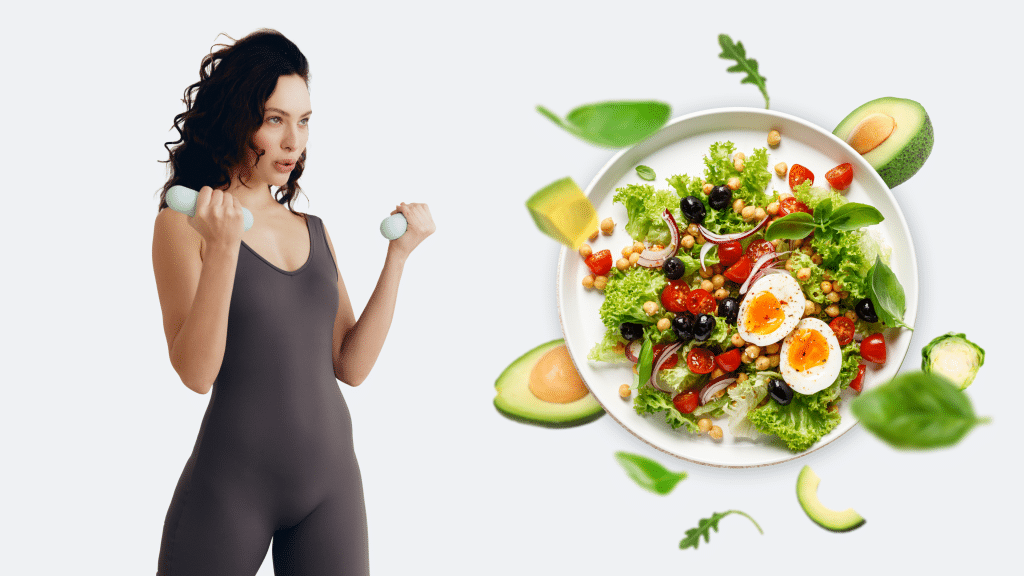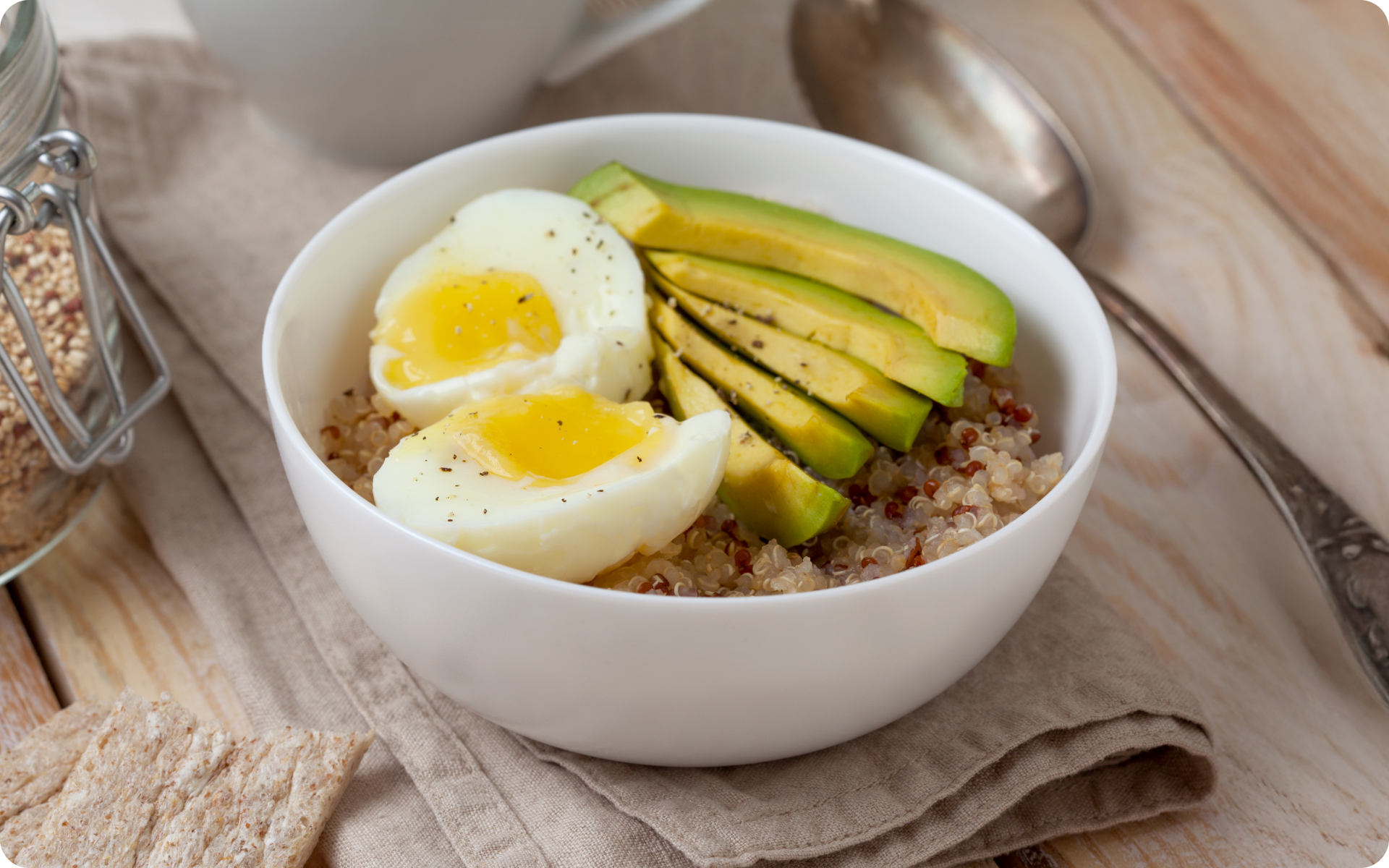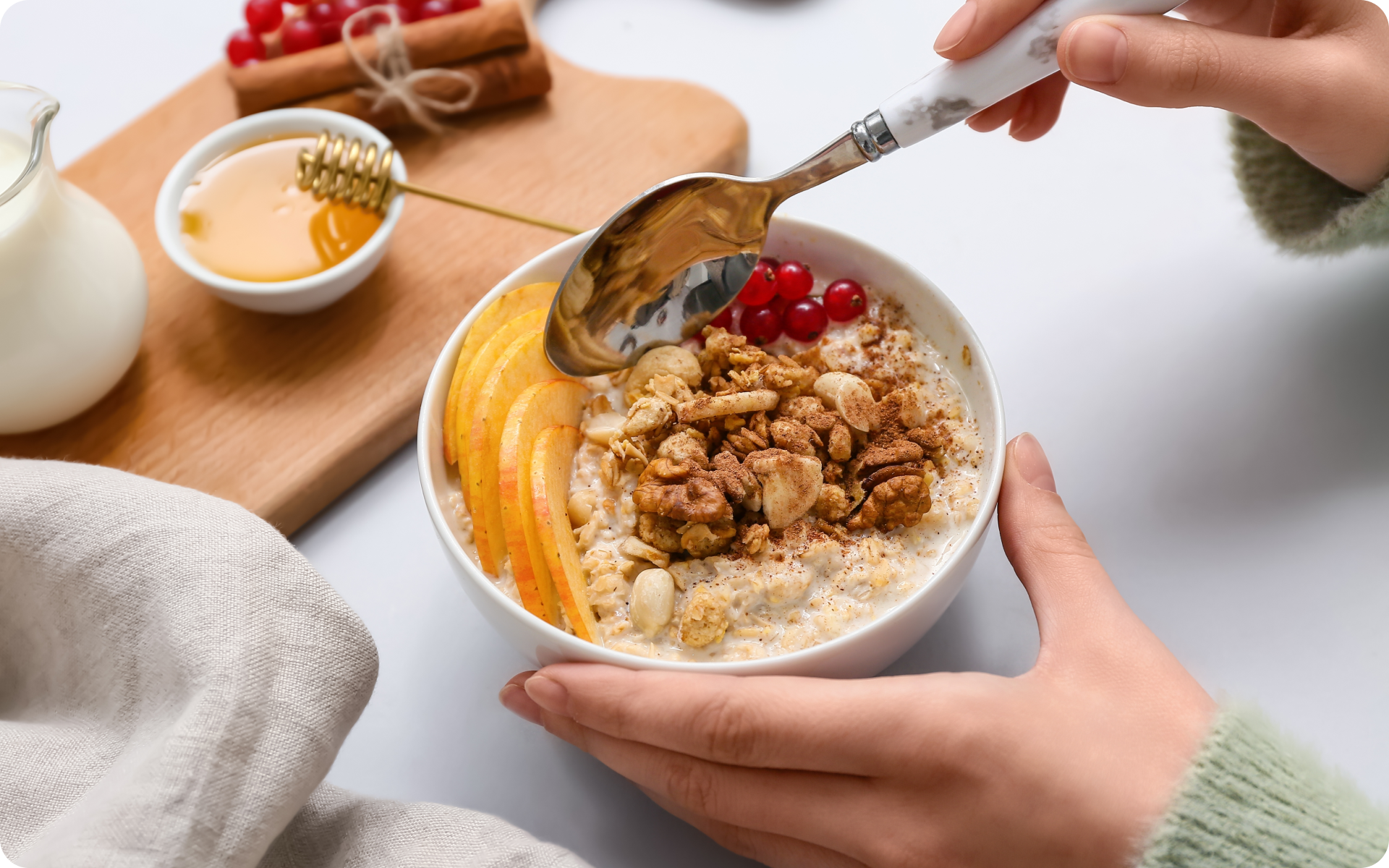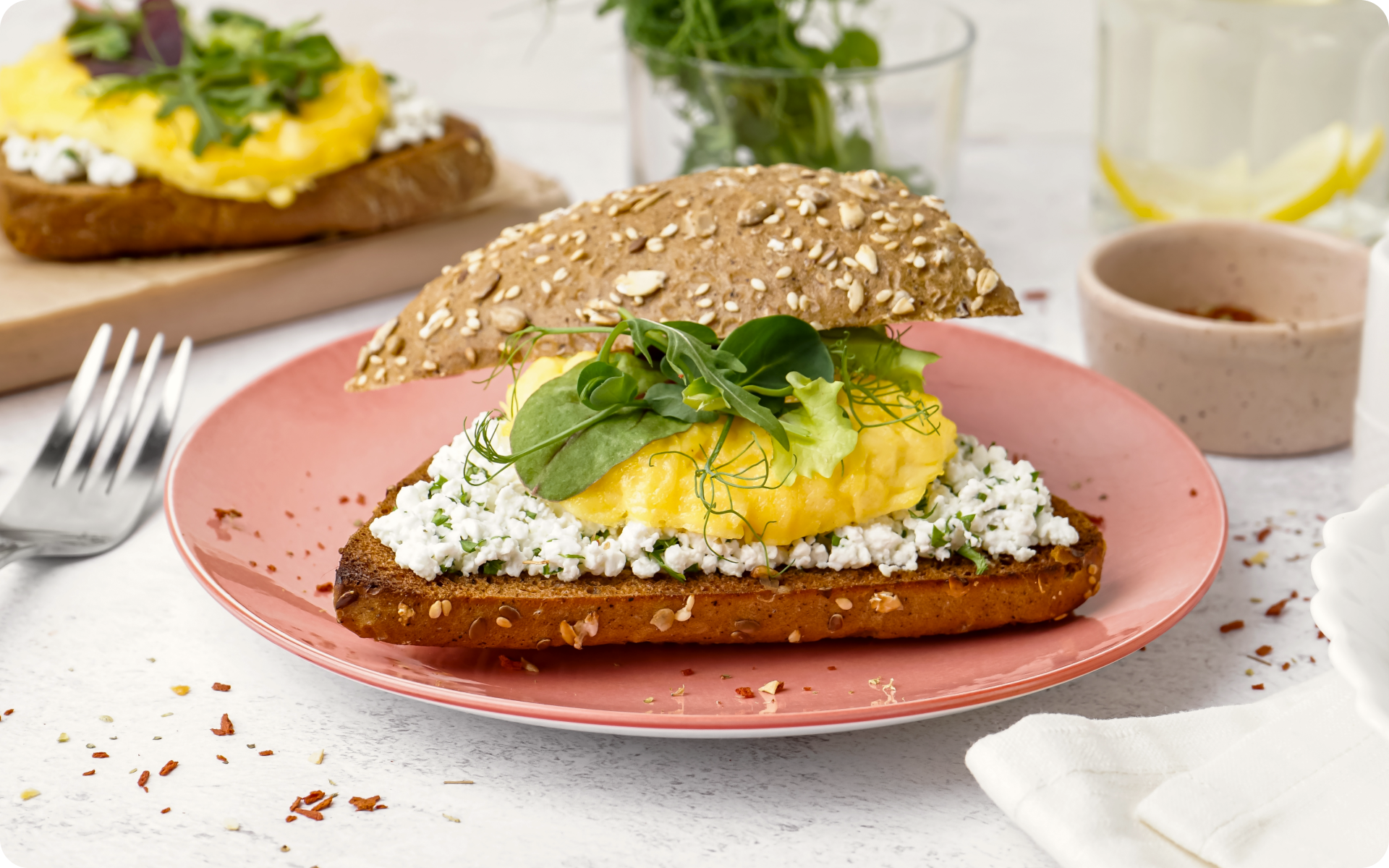Protein brings loads of benefits to your body. It helps build and repair your body’s tissues, including muscle tissue. It drives chemical reactions, provides structure, and supports the immune system. Eating more protein also helps you feel fuller for longer, which can help if you’ve reduced your calorie intake to lose weight.
People following a calorie-restriction diet often need help to advance their plans because of the monotony and lack of recipes. If you want to keep your daily intake within 1400 calories while keeping your protein levels intact, you should learn about protein-rich foods that fit into the 1400-calorie diet plan. Whether you want to lose weight or maintain your muscles, having more proteins can help you reach your targets smoothly (1).
This article covers information on what happens when you consume a protein-rich diet and how you can make it work in your favor. Keep reading to find out more!
What is a 1400 Calorie Meal Plan High Protein?
A 1400-calorie high-protein meal plan is a structured eating plan designed to provide you with 1400 calories daily. It emphasizes foods rich in proteins, although you can include other macros.
A typical plan provides:
- Fiber
- Healthy fats
- Complex carbs
- The required protein content (2)
This meal plan aims to help individuals hit their fitness goals and keep them feeling fuller for longer due to a high protein content.
When eating 1400 calories a day, each meal should consist of 300 to 400 calories, while the calorie content in snacks should lie in the range of 100-150. Focusing on balanced food combinations will keep you feeling fuller for longer.
Before you start a meal plan of this kind, you should talk to your healthcare provider or a registered dietitian. According to Steffani Sassos, the Nutrition Lab Director at Good Housekeeping Institute, eating 1400 calories every day is for short-term goals. It is usually adopted for quick weight loss and may not be the right amount for some individuals.
If you wish to free yourself from all the extra pounds that have been weighing you down for way too long, start using the BetterMe: Health Coaching app and overhaul your entire life!
Easy 7-Day 1400 Calorie Meal Plan High Protein for Weight Loss
If you are on the fence and don’t know how to start your weight loss journey, this plan might be a good starting point. Below, we have created a sample 7-day 1400-calorie meal plan to give you an insight into how your daily menus should look like:
Day 1
- Breakfast: Scrambled eggs (2) with spinach and a slice of whole-grain toast
- Snack: Greek yogurt (unsweetened) with a handful of almonds
- Lunch: Grilled chicken salad with mixed greens, avocado, and olive oil vinaigrette
- Snack: Cottage cheese with cucumber slices
- Dinner: Baked salmon with quinoa and roasted broccoli
Day 2
- Breakfast: Oatmeal made with almond milk, topped with chia seeds and berries
- Snack: Hard-boiled egg and a handful of walnuts
- Lunch: Turkey and avocado lettuce wrap with hummus
- Snack: Protein shake (whey or plant-based)
- Dinner: Stir-fried tofu with mixed veggies (broccoli, bell peppers) and a small portion of brown rice
Day 3
- Breakfast: Protein pancakes with a side of blueberries
- Snack: Apple slices with peanut butter
- Lunch: Grilled chicken breast with roasted sweet potatoes and green beans
- Snack: Low-fat cheese stick with cherry tomatoes
- Dinner: Tuna salad (tuna, Greek yogurt, celery, and onions) with whole grain crackers or bread
Day 4
- Breakfast: Smoothie (spinach, protein powder, banana, almond milk)
- Snack: Cottage cheese with pineapple chunks
- Lunch: Turkey burger with a side salad and olive oil dressing
- Snack: Edamame
- Dinner: Baked cod with lentils and sautéed spinach
Day 5
- Breakfast: Scrambled eggs with bell peppers and mushrooms and a slice of avocado toast
- Snack: Mixed nuts
- Lunch: Quinoa bowl with black beans, grilled chicken, salsa, and a dollop of Greek yogurt
- Snack: Protein bar (low-sugar)
- Dinner: Grilled shrimp with zucchini noodles and marinara sauce
Day 6
- Breakfast: Greek yogurt parfait with berries and granola
- Snack: Celery sticks with hummus
- Lunch: Grilled chicken wrap with whole wheat tortilla, spinach, and avocado
- Snack: Protein shake
- Dinner: Turkey meatballs with spaghetti squash and marinara sauce
Day 7
- Breakfast: Egg white omelet with mushrooms and spinach and a slice of whole grain toast
- Snack: Almonds and a piece of fruit
- Lunch: Grilled salmon salad with mixed greens, avocado, and balsamic dressing
- Snack: Greek yogurt with chia seeds
- Dinner: Chicken stir-fry with cauliflower rice and mixed veggies
This plan balances proteins, fats, and carbs to ensure your body gets enough nutrients. However, we encourage you to be creative and plan your meals according to your available vegetables/fruits and other foods.
A 1,400 calories a day female meal plan can include these additions:
- Add fortified cereal to breakfast for extra iron and folate, crucial for women’s health (3).
- Include leafy greens with lunch to boost calcium and folate intake, supporting bone and reproductive health (4).
- Add a citrus fruit to your snack for additional folate for women of childbearing age (5).
- Add beans or lentils to your quinoa bowl to enhance iron intake, compensating for menstrual loss (6).
- Include fortified orange juice with breakfast to boost calcium and vitamin D levels.
- Add walnuts to your snack for healthy fats, ensuring a balance of omega-3 and omega-6 fatty acids.
These adjustments help meet women’s nutritional needs, ensuring a balanced and effective 1,400-calorie meal plan.
A 1,400 calorie meal plan high protein vegetarian is possible with these simple swaps:
- Replace meat with high-protein legumes like lentils, chickpeas, and black beans to boost protein intake.
- Incorporate tofu or tempeh instead of meat for a protein-rich alternative that provides essential amino acids.
- Use Greek yogurt as a snack or in recipes for an extra protein boost and probiotics.
These swaps can help you maintain a high-protein vegetarian diet while keeping your calorie intake at 1,400 (7).
Find out if the fruit diet for weight loss in 7 days is a good fit for your body!
Is 1400 Calories Realistic?
Consuming low-calorie, high-protein foods within 1400 calories may not be enough for everyone. This amount is too low and unsustainable for many to achieve the desired energy levels. In fact, according to the Academy of Nutrients and Dietetics, following a low-calorie diet can lead to the following side effects (8):
- Brain fog or decreased ability to focus
- Not meeting your nutritional needs
- Slow metabolism
- Gallstones
According to the 2020-2025 Dietary Guidelines for Americans, adult males require between 2,000 and 3,000 calories per day, depending on their age, activity level, and other factors. Meanwhile, adult females need 1,600 to 2,400 calories (2). These recommendations apply to people who engage in moderate physical activity. Note that the caloric requirements may differ based on a person’s specific activity level. Your body size and health conditions can also influence your calorie needs.
So yes, 1400 calories is a realistic goal for some people, depending on individual factors.
For most, it will create a calorie deficit required for weight loss. If you are highly active and have a larger body size, 1400 calories might be too few, even if weight loss is the goal. Talk to your healthcare provider or a registered dietitian for individualized advice.
Read more: 1,300-Calorie Meal Plan: High-Protein Diet
Can I Lose Weight Eating 1400 Calories a Day?
Quick answer: Probably, yes!
Eating 1400 calories per day will create a calorie deficit for most people. For example, if your daily energy needs are around 1900, aiming for 1400 calories per day will create a deficit of 500 calories per day.
This deficit can lead to a weight loss of around 1 pound per week. Planning what and how much you will eat at mealtime can help control hunger and make it easier to stick with the plan. Some tips that could help in this regard are:
Follow the Plate Method
The Follow the Plate Method is straightforward. Divide your plate into sections and fill each with a food group. Take the recommendation from the American Diabetes Association as an example (9). Start by filling half your plate with vegetables, the other quarter with proteins, and the last quarter with complex carbs.
Adoption of this method takes the guesswork out of your meal planning. You can make informed, health-oriented decisions for a successful weight loss journey.
Eat Foods Rich in Fiber
A 2020 review in Nutrients linked higher fiber intake to:
- Healthier gut bacteria
- Better digestion (improved bowel movements)
- Reduced risk of heart disease (10)
Likewise, a 2023 study in Frontiers in Nutrition found that participants who consumed more fiber from fruits, vegetables, whole grains, beans, and nuts lost more weight than those with lower fiber intake (11).
Despite its outstanding impacts, most people don’t get enough fiber. A survey shows that Americans eat only 16 grams of fiber per day, far from the 28 grams recommended by the American Dietary Guidelines (2). Fiber takes longer to digest, making you feel fuller for longer, which can help you eat less.
Typically, the fiber-rich diet may look like this:
- Have some fruit with your breakfast.
- Eat a salad with mixed greens and bulgur or farro for lunch.
- Enjoy veggies as a snack.
- Include 1 cup of cooked vegetables with your dinner.
If you are not used to eating foods high in fiber, gradually add more fiber-rich foods to your meals and drink more water during the day. Overeating fiber too fast can cause gas or bloating.
Consume Lean Proteins to Stabilize Hunger
Sources of lean protein like fish, eggs, chicken, and turkey also take longer to digest. They can keep you satisfied for longer, so you don’t get hungry or have as many cravings. Moreover, lean proteins also support muscle growth and boost overall energy, according to the Cleveland Clinic (12).
Some lean protein sources you can add to your diet include:
- Fish and shellfish
- Skinless chicken breast
- Tofu, tempeh, and seitan
- Beans, lentils, and other legumes
- Greek yogurt and cottage cheese
Track Calories
This is an important tip to ensure you get closer to your weight loss goals.
Keeping an eye on your daily calorie intake can help you to stay within the 1400-calorie limit. To lose one pound, you need a deficit of 3,500 calories. If your basal metabolic rate is about 1,900 calories and you start eating 1,400 calories daily, you will create a weekly deficit of 3,500 calories. This should be enough to lose around one pound per week.
To track your intake accurately, use an online calorie counter and log everything you eat and drink.
A well-rounded approach can breathe life into your 1400-calorie high-protein meal plan. For this, you should get help from a certified professional who evaluates all the individual factors and recommends lifestyle tweaks that could help you stay energetic and healthy while following such plans.
Looking for low-calorie high-protein foods for weight loss? Our recent article shares helpful information about this!
BetterMe is your fast-track ticket to long-lasting weight loss! Tailor your fitness journey and maximize your results with just a couple of swipes!
Will 1400 Calories Slow My Metabolism?
Yes, there is a chance that your metabolism slows down when you consume less calories. Sometimes, a calorie deficit can be counterproductive when the calorie intake drops too low. When the body senses that the food is scarce, it slows down the rate at which it burns it.
Whether eating 1400 calories per day for an extended period will slow down your metabolism is difficult to predict. This is probably more likely if 1400 calories creates too large an energy deficit because your baseline energy needs are high. It’s probably a good starting point to aim for a deficit of 500 calories per day, which means eating 500 calories less than your estimated energy needs to maintain your weight.
The lesson here is don’t restrict your calories too much. Even the 1400-calorie consumption can be straining for some people. Hence, take care of your body and nourish it with enough nutrients.
This is how B vitamins for weight loss can benefit your journey!
What Should My Macros Be on A 1400-Calorie Diet?
When following a 1400-calorie diet, your macronutrient consumption depends on your fitness goals. Determine if you want to lose weight, build your muscles, or maintain good health.
A typical but balanced breakdown of macros to have on a 1400-calorie diet is as follows:
Carbohydrates: 45–55%
- Calories from Carbs: 630–770 calories
- Grams of Carbs per Day: 158–193 grams
Protein: 25–30%
- Calories from Protein: 350–420 calories
- Grams of Protein per Day: 88–105 grams
Fats: 20–30%
- Calories from Fat: 280–420 calories
- Grams of Fat per Day: 31–47 grams
You can adjust these macros according to your requirements. For example, if you do strenuous exercise, you might need more carbohydrates for energy.
Getting your macros (and micronutrients) from various foods is also essential. Don’t rely on chicken breast as your only protein source and rice as your complex carb – mix it up so you get various nutrients and hit all your bases.
Read more: The Best High Protein Vegan Foods To Try Today
How Much Protein Should I Eat on A 1400-Calorie Diet?
As discussed above, proteins should make up around 25-30% of your calories if you aim for a high-protein diet. Since each gram of protein provides 4 calories, you would need 88–105 grams of protein per day.
A few guidelines for protein intake according to your goals are:
- Weight loss and muscle maintenance: the higher end is around 100 grams of protein.
- Muscle building or a very active lifestyle: 30% (around 105 grams) is a solid starting point.
- General health or moderate activity: 25% (about 88 grams) can be sufficient.
Lean protein sources like tofu, fish, eggs, and chicken can allow you to meet your protein goals without crossing your calorie limits.
How to Eat 150g of Protein on a 1400-Calorie Diet?
The goal of eating 150 grams is quite precise, and you should carefully plan your meals to meet this. A sample meal plan that has 150 grams of protein and is within the 1400 calorie diet limit should look like this:
Breakfast
- 4 egg whites + 1 whole egg (20g protein, 130 calories)
- 1 cup low-fat Greek yogurt (20g protein, 100 calories)
- Handful of spinach (1g protein, 10 calories)
Total: 41g protein, 240 calories
Snack
- 1 scoop whey protein (25g protein, 120 calories)
Total: 25g protein, 120 calories
Lunch
- 6 oz grilled chicken breast (40g protein, 250 calories)
- 1 cup steamed broccoli (3g protein, 55 calories)
- 1/2 cup cooked quinoa (4g protein, 111 calories)
Total: 47g protein, 416 calories
Snack
- 1/2 cup low-fat cottage cheese (14g protein, 90 calories)
Total: 14g protein, 90 calories
Dinner
- 5 oz grilled salmon (35g protein, 280 calories)
- 1 cup zucchini noodles (2g protein, 20 calories)
Total: 37g protein, 300 calories
Daily Totals: 164 g protein and around 1,166 calories (leaving room for small additions like olive oil, seasoning, or a small snack).
Since keto foods are high in fat and moderate in protein, they can help you feel satisfied, making you less likely to overeat. These keto-friendly options might make you feel full with smaller portions, making it easier to stick to a 1400-calorie daily plan. However, whether 1400 calories is enough for you has little to do with what diet you are on and everything to do with your individual energy needs, which are influenced by factors like age, sex, body size, and activity level. Five hard-boiled eggs or 8 egg whites give you 30 grams of protein (6 grams per egg). Eggs are a popular high-protein breakfast choice and also provide healthy fats. 100 grams of chicken breast or 150 grams of salmon also contain around 30 grams of protein. 100 grams of beef steak contains about 25 grams of protein. Load up on lean protein-rich options like chicken breast, salmon, shrimp, beans, and plenty of crunchy, satisfying fiber-rich veggies. Try to enhance everything with bold flavors from various spices and cooking methods. A 50g serving of fresh avocado has 1 gram of protein, while a whole 5-ounce avocado (about 3 servings) provides 3 grams of protein.Frequently Asked Questions
Is 1400 calories enough on keto?
What do 30 grams of protein look like?
How do you stay full on 1400 calories a day?
Does avocado have protein?
The Bottom Line
Following a 1400-calorie, high-protein meal plan can be a great way to support your fitness goals. A careful balance of fats, proteins, and carbs while focusing on lean proteins can help you feel fuller. You can also stay within your daily caloric limits when your diet is enriched with proteins.
Before we sign out, we would like to remind you to get help from a registered dietitian. While relying on online assistance is okay, you shouldn’t overlook the importance of professional guidance.
The best part of this diet is that it is simple and flexible. There is no need to sacrifice flavors or variety. With the right mindset, you can set yourself up for practical and sustainable results!
DISCLAIMER:
This article is intended for general informational purposes only and does not serve to address individual circumstances. It is not a substitute for professional advice or help and should not be relied on for making any kind of decision-making. Any action taken as a direct or indirect result of the information in this article is entirely at your own risk and is your sole responsibility.
BetterMe, its content staff, and its medical advisors accept no responsibility for inaccuracies, errors, misstatements, inconsistencies, or omissions and specifically disclaim any liability, loss or risk, personal, professional or otherwise, which may be incurred as a consequence, directly or indirectly, of the use and/or application of any content.
You should always seek the advice of your physician or other qualified health provider with any questions you may have regarding a medical condition or your specific situation. Never disregard professional medical advice or delay seeking it because of BetterMe content. If you suspect or think you may have a medical emergency, call your doctor.
SOURCES:
- The role of protein in weight loss and maintenance (2015, pubmed.ncbi.nlm.nih.gov)
- Dietary Guidelines for Americans, 2020-2025 (2020, dietaryguidelines.gov)
- https://www.webmd.com/women/features/women-nutrition
- https://www.healthline.com/health/healthy-eating/7-nutrients-young-women-need-more-of
- https://www.womenshealth.gov/healthy-eating/how-eat-health/healthy-eating-plan-women
- https://www.webmd.com/women/features/women-nutrition
- https://www.eatingwell.com/7-day-no-sugar-high-protein-vegetarian-meal-plan-8426176
- 4 Ways Low-Calorie Diets Can Sabotage Your Health (2021, eatright.org)
- Tips for Eating Well (n.d., diabetes.org)
- The Health Benefits of Dietary Fibre (2020, pmc.ncbi.nlm.nih.gov)
- Increased dietary fiber is associated with weight loss among Full Plate Living program participants (2023, frontiersin.org)
- 4 Ways Protein Can Help You Shed Pounds (2022, health.clevelandclinic.org)
